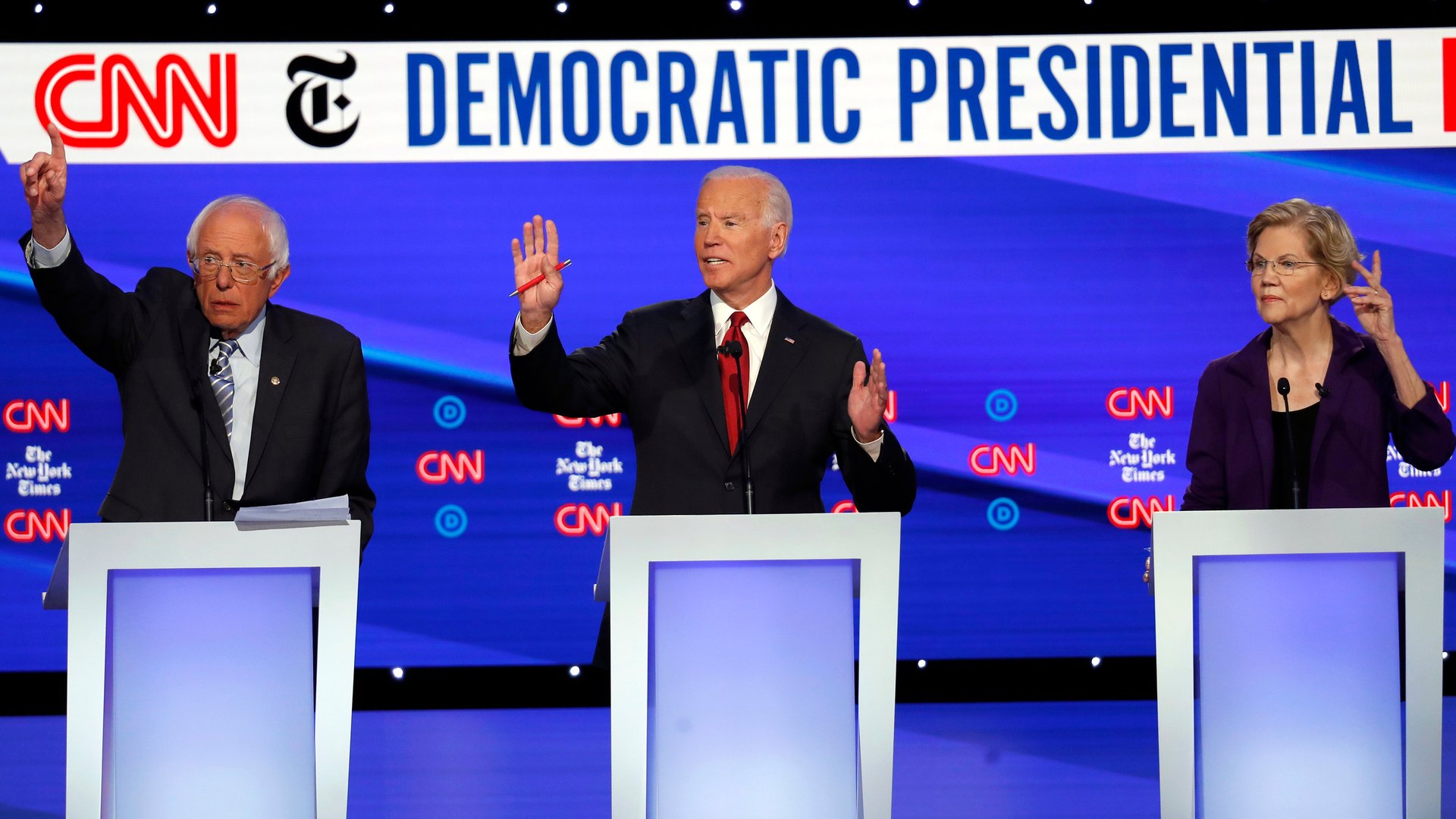New poll shows Elizabeth Warren could bridge the Democrats’ generational divide
Three septuagenarians are leading the race to challenge US president Donald Trump in 2020. But it’s their ability to appeal to both young and old voters alike that will determine who comes out on top.


Three septuagenarians are leading the race to challenge US president Donald Trump in 2020. But it’s their ability to appeal to both young and old voters alike that will determine who comes out on top.
An exclusive national poll conducted days before tonight’s Democratic primary debate on MSNBC shows the top three candidates remain former vice president Joe Biden, senator Bernie Sanders, and senator Elizabeth Warren. The new polling data, and Warren’s rise to compete with Sanders in a second-place deadlock, helps reveal the role generational divides are playing in the election, which begins in earnest with Iowa’s first-in-the nation caucuses in January.
The scrap between the three front-runners has played out as a generational conflict: Biden, who offers himself as a moderate, leads the field by winning voters older than 45, who make up the majority of the primary participants. Sanders, a self-described socialist, has won his lead among voters under 30. And Warren, who portrays herself as a capitalist with plans for deep structural reform, has been the candidate with the most balanced appeal, with her recent gains coming among voters ages 30 to 44.
Almost half of young voters, meanwhile, haven’t chosen any of the three front-runners as their first preference, raising the possibility that they could be kingmakers in the primary cycle. Historically, young voters haven’t been the most important voices in primary elections, but their unusual turnout during the 2018 Congressional midterm elections are evidence that these may be special circumstances.
Rank and File
To obtain our data, Quartz worked with Swayable, a firm that tests messages for companies and campaigns using a unique platform that distributes survey questions to users of third-party mobile apps.
The ubiquity of smartphone usage allows the firm to gather large samples across many demographics, including younger voters who are less likely to have a home telephone, the traditional point of contact for political polling. This survey of voter preference was conducted independently of the message-testing work that is Swayable’s bread-and-butter. The company said it works for several Democratic campaigns that it declined to name, but federal election filings show the company has been paid by the campaigns of both Sanders and billionaire Tom Steyers.
The poll asked likely voters 1 to rank the primary candidates, a useful way to understand the broader preferences of voters who will not have to make a final decision for months and may see the field winnowed before they do. When the voting starts, second-tier candidates like South Bend, Indiana Mayor Pete Buttigieg, who now leads Iowa polls, could pop nationally, and long-shot campaigns will drop out once the voters start making their choices. In our most recent poll, likely voters who aren’t backing any of the front-runners ranked Warren highest among the top three.
We’re not the first to spot this trend, which suggests her campaign may offer something of a consensus as a crowded field shrinks. The question facing her team is whether she can become the number one choice. Her own supporters report they are less confident that she can win a general election than the supporters of the other two leading candidates, which may be a recognition (or internalization) of misogyny at work in the election.
The politics of age
In the last two weeks, Warren has given up ground to Sanders and Biden, finding herself locked in a national tie for second place with the Vermont lawmaker. Biden has actually gained across all three age groups polled on Nov. 16.
The changes may be connected to Warren’s position on Medicare for All, the shorthand for creating a single-payer health care system in the United States by expanding Medicare, a public health insurance program for seniors. With universal health care a shared goal of the Democratic party, the primary has seen major debates over how and when to move to such a system.
On Nov. 7, Warren released a detailed health care plan, explaining how she would attempt to move towards Medicare for All in stages, beginning with a voluntary public health insurance plan, without raising taxes on the middle class. The program reflects legislative realism: Without a major change in the control of the senate and the abandonment of the filibuster procedure, even a minority of Republican lawmakers would likely block a major expansion of public services.
But the move also led some on the left to question her commitment to single-payer healthcare, creating a new division between her and Sanders, and opens her up to specific criticism from centrists who argue that the United States cannot offer the kind of public health care provided by many poorer countries.
Democrats have not met on the debate stage for over a month and this will be the first time voters will see how Warren responds to these critiques live onstage. Will she be able to recover her multi-generational mojo, or can Sanders or Biden figure out how to reach the voters—old and young, respectively—who have tuned them out thus far?